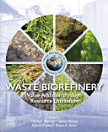Biotic Resources: Circular Bioeconomy Perspective
À propos de cet e-book
À propos de l'auteur
Dr. Thallada Bhaskar is Senior Principal Scientist and Head, Material Resource Efficiency Division at the CSIR-Indian Institute of Petroleum, Dehradun, India. He completed his Ph.D. from Osmania University, Hyderabad, India. He carried out Postdoctoral Research at Okayama University, Okayama, Japan after which he worked there as Assistant Professor for 5 years. He has been conferred upon awards such as Scientist of the Year, Raman Research Fellowship, CAS Presidential award for the Foreign Fellows, Distinguished Researcher Award, to name a few. He has more than 200 publications in journals of international repute and 38 book chapters. He has 15 patents to his credit with an h-index of 54 (total citations: ~8913).
Dr. Sunita Varjani is a Scientific Officer at the Gujarat Pollution Control Board, Gandhinagar, Gujarat, India. Her major areas of research are Industrial and Environmental Biotechnology, Wastewater Treatment & Process Engineering, Bioprocess Technology and Waste Management. She has worked as visiting scientist at EPFL, Lausanne, Switzerland. Dr. Varjani has authored more than 350 publications, including research and review papers, books, book chapters and conference communications. She has been enlisted as Highly Cited Researcher (Top 2% in the World), Elsevier Citation Report (2021). She has been selected as a Member of The National Academy of Sciences, India (NASI) in the year 2021.
Dr. Bhavya B Krishna is a Senior Scientist & Head of Area, Sustainability Impact Assessment Area, Material Resource Efficiency Division at CSIR-Indian Institute of Petroleum, Dehradun. She obtained her Ph.D. in 2015 for her work on pyrolysis of lignocellulosic biomass. Her research experience of around 10 years encompasses works utilizing several biomass feedstocks such as agricultural and forest residues, aquatic biomass, de-oiled cakes etc. She is an author of 40 papers in peer-reviewed international journals, 15 book chapters in books by publishers of international repute, recipient of awards at international conferences, filed 1 Indian patent.
Professor Ashok Pandey is currently a Distinguished Scientist at the Centre for Innovation and Translational Research, CSIR-Indian Institute of Toxicology Research, Lucknow, India, and Executive Director (Honorary) at the Centre for Energy and Environmental Sustainability – India. His major research and technological development interests are industrial & environmental biotechnology and energy biosciences, focusing on biomass to biofuels & chemicals, waste to wealth & energy, industrial enzymes. He has ~1550 publications/communications, which include 16 patents, 108 books, ~850 papers and book chapters, etc with h index of 114 and >56,500 citations on Google scholar.






